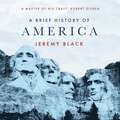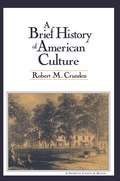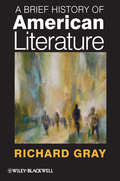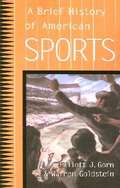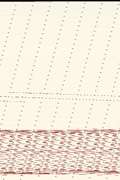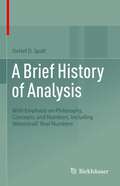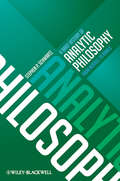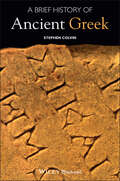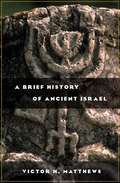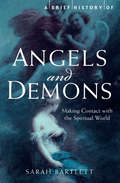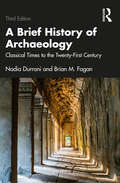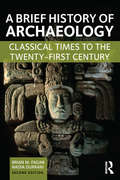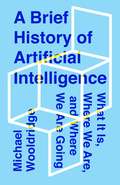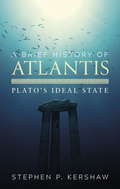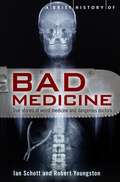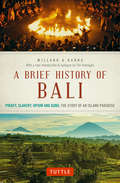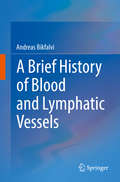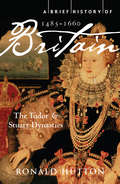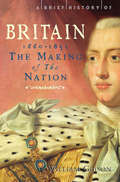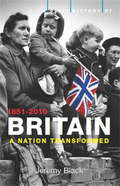- Table View
- List View
A Brief History of America (Brief Histories)
by Jeremy BlackThe next in this series of admirably concise yet nevertheless comprehensive titles looks at the history of all Americans as well as America; its environmental history and its linkage to economic history; the political shaping of America; and America in the world, from being a colony to post-Cold War America.Black examines the environmental history of America and its linkage to economic history, crucially, the clearing of forests; the spread of agriculture; mineral, coal and iron extraction; industrialisation; urbanisation; and current and growing climate-crisis concerns.He explores the political shaping of America: indigenous American polities; free European and unfree African settlements; the creation of an American State, and its successes and failures from 1783 to 1861; Civil War; democratisation; the rise of the federal Government from the 1930s; the Civil Rights movement from the 1950s onwards, and tensions in more recent governance. The book considers America in the World: as a pre-colonial and colonised space; as a newly-independent power, then a rising international one, the Cold War and the USA as the sole superpower in the post-Cold-War world. These key themes are tackled chronologically for the sake of clarity, beginning with the geological creation of North America, human settlement and native American cultures to 1500; the arrival of Europeans and enslaved Africans to 1770 - the Spanish and French in the Gulf of Mexico and Florida, the English and French, and the Dutch and Swedes further north.The focus then shifts to settler conflicts with native Americans and between European powers leading to a British-dominated North America by 1770. Then the end of European rule and the foundation of an American trans-continental state. The section dealing with the years from 1848 to 1880 looks at the Civil War between North and South, reconstruction and the creation of a new society.Between 1880 and 1920, the United States became an industrial powerhouse and an international power, also a colonial power - the Philippines, Hawaii, Puerto Rico - and a participant in the First World War.The interwar years, 1921 to 1945, brought turmoil: the Roaring Twenties; the growth of Hollywood; Prohibition; jazz; the Great Depression and the New Deal; finally the Second World War. 1945 to 1968 was the American Age, brimming with confidence and success as the world's leading power, but also the ongoing struggle for civil rights. Subsequent years to 1992 brought crisis and recovery: Watergate, the Reagan years and the USA as the sole world superpower.In bringing the book right up to the present day, Black looks at factors that divide American society and economy, though it remains a country of tremendous energy.
A Brief History of American Culture
by Robert M. Crunden"The discussion of each period is wide-ranging, analyzing movements and spotlighting major figures in politics and philosophy, law and literature, economics and education, jazz and journalism, science and civil rights. A readable, insightful overview of the underlying patterns that give shape to U.S. cultural history. Nonacademic readers will find Crunden's selective bibliographical essay helpful". -- Booklist
A Brief History of American Literature
by Richard GrayA Brief History of American Literature offers students and general readers a concise and up-to-date history of the full range of American writing from its origins until the present day. Represents the only up-to-date concise history of American literature Covers fiction, poetry, drama and non-fiction, as well as looking at other forms of literature including folktales, spirituals, the detective story, the thriller and science fictionConsiders how our understanding of American literature has changed over the past twenty yearsOffers students an abridged version of History of American Literature, a book widely considered the standard survey text Provides an invaluable introduction to the subject for students of American literature, American studies and all those interested in the literature and culture of the United States
A Brief History of American Sports
by Warren Goldstein Elliott J. GornHow sports have changed! At the end of our century, a baseball player won a contract that paid him several million dollars a year; a boxer consistantly earns millions of dollars for a single fight; a television network pays billions and billions to broadcast our national pastime. Two distinguished cultural historians trace the evolution of American play from its English origins through the explosive and controversies of modern sports. From the eariest years, our attitudes about games have been played by major social and cultural forces, religious structures, industrialization, racial and gender discrimination, drug abuse, the growth of the cities, the power of money, and the rise of mass culture.
A Brief History of American Sports
by Warren Goldstein Elliott J. Gorn<p>Elliott J. Gorn and Warren Goldstein show us where our games and pastimes came from, how they developed, and what they have meant to Americans. The great heroes of baseball and football are here, as well as the dramatic moments of boxing and basketball. Beyond this, the authors show us how sports fit into the larger contours of our past. <p>For this new edition, the authors have updated the book to include discussion of performance-enhancing drugs; player salaries, unions, and the business of internationalizing sport; Title IX and gender in American sports; race, especially the entry of Latino and Asian athletes; and the corporatization of amateur athletics. A Brief History of American Sports reveals that from colonial times to the present, sports have been central to American culture, and a profound expression of who we are.</p>
A Brief History of Analysis: With Emphasis on Philosophy, Concepts, and Numbers, Including Weierstraß' Real Numbers
by Detlef D. SpaltThis book explores the origins of mathematical analysis in an accessible, clear, and precise manner. Concepts such as function, continuity, and convergence are presented with a unique historical point of view. In part, this is accomplished by investigating the impact of and connections between famous figures, like Newton, Leibniz, Johann Bernoulli, Euler, and more. Of particular note is the treatment of Karl Weierstraß, whose concept of real numbers has been frequently overlooked until now. By providing such a broad yet detailed survey, this book examines how analysis was formed, how it has changed over time, and how it continues to evolve today. A Brief History of Analysis will appeal to a wide audience of students, instructors, and researchers who are interested in discovering new historical perspectives on otherwise familiar mathematical ideas.
A Brief History of Analytic Philosophy: From Russell to Rawls
by Stephen P. SchwartzA Brief History of Analytic Philosophy: From Russell to Rawls presents a comprehensive overview of the historical development of all major aspects of analytic philosophy, the dominant Anglo-American philosophical tradition in the twentieth century. Features coverage of all the major subject areas and figures in analytic philosophy - including Wittgenstein, Bertrand Russell, G.E. Moore, Gottlob Frege, Carnap, Quine, Davidson, Kripke, Putnam, and many othersContains explanatory background material to help make clear technical philosophical conceptsIncludes listings of suggested further readingsWritten in a clear, direct style that presupposes little previous knowledge of philosophy
A Brief History of Ancient Greek (Wiley Brief Histories of the Ancient World)
by Stephen ColvinA Brief History of Ancient Greek accessibly depicts the social history of this ancient language from its Indo-European roots to the present day. Explains key relationships between the language and literature of the Classical period (500 - 300 BC) Provides a social history of the language which transliterates and translates all Greek as appropriate, and is therefore accessible to readers who know little or no Greek Written in the framework of modern sociolinguistic theory, relating the development of Ancient Greek to its social and political context Reflects the latest thinking on subjects such as Koiné Greek and the relationship between literary and vernacular Greek
A Brief History of Ancient Israel
by Victor MatthewsGrounded in the latest archeological developments, Victor Matthews'sA Brief History of Ancient Israel presents a concise history of Israel covering the ancestral period, conquest and settlement, the monarchy, and both the exilic and postexilic periods. Using supplemental figures and insets, the author concentrates on providing a cogent and condensed discussion of events. He examines historical geography, archaeological data, and, where relevant, comparative cultural materials from other ancient Near Eastern civilizations. With an accessible yet high-quality introduction,A Brief History of Ancient Israel will be of immense value to both students of the Old Testament and the scholars who teach them.
A Brief History of Angels and Demons (Brief Histories )
by Sarah BartlettThroughout history, the human quest for knowledge of the divine, has ruffled the wings of many an angel, but also tested the wrath of the demon. This book not traces the history of angels and demons from their earliest roots to their modern day renaissance, but also reveals their most intimate secrets. Whether through personal stories, literature, myth, religion or art, this book is the story of how belief in angels and demons has cast a powerful spell over the popular imagination.
A Brief History of Angels and Demons (Brief Histories)
by Sarah BartlettThroughout history, the human quest for knowledge of the divine, has ruffled the wings of many an angel, but also tested the wrath of the demon. This book not traces the history of angels and demons from their earliest roots to their modern day renaissance, but also reveals their most intimate secrets. Whether through personal stories, literature, myth, religion or art, this book is the story of how belief in angels and demons has cast a powerful spell over the popular imagination.
A Brief History of Archaeology: Classical Times to the Twenty-First Century
by Brian M. Fagan Nadia DurraniA Brief History of Archaeology details early digs and covers the development of archaeology as a multidisciplinary science, the modernization of meticulous excavation methods during the twentieth century, and the important discoveries that led to new ideas about the evolution of human societies. Spanning more than two thousand years of history, this short account of the discipline of archaeology tells of spectacular discoveries and the colorful lives of the archaeologists who made them, as well as of changing theories and current debates in the field. Early research at Stonehenge in Britain, burial mound excavations, and the exploration of Herculaneum and Pompeii culminate in the nineteenth-century debates over human antiquity and the theory of evolution. The book then moves on to the discovery of the world’s pre-industrial civilizations in Egypt, Mesopotamia, and Central America; the excavations at Troy and Mycenae; the Royal Burials at Ur, Iraq; and the dramatic finding of the pharaoh Tutankhamun in 1922. The book concludes by considering recent sensational discoveries and exploring the debates over processual and post-processual theory that have intrigued archaeologists in the early twenty-first century. The third edition updates this respected introduction to one of the science’s most fascinating disciplines. A Brief History of Archaeology is a vivid narrative that will engage readers who are new to the discipline, drawing on the authors’ extensive experience in the field and classroom.
A Brief History of Archaeology: Classical Times to the Twenty-First Century
by Brian M. Fagan Nadia DurraniThis short account of the discipline of archaeology tells of spectacular discoveries and the colorful lives of the archaeologists who made them, as well as of changing theories and current debates in the field. Spanning over two thousand years of history, the book details early digs as well as covering the development of archaeology as a multidisciplinary science, the modernization of meticulous excavation methods during the twentieth century, and the important discoveries that led to new ideas about the evolution of human societies. A Brief History of Archaeology is a vivid narrative that will engage readers who are new to the discipline, drawing on the authors’ extensive experience in the field and classroom. Early research at Stonehenge in Britain, burial mound excavations, and the exploration of Herculaneum and Pompeii culminate in the nineteenth century debates over human antiquity and the theory of evolution. The book then moves on to the discovery of the world’s pre-industrial civilizations in Egypt, Mesopotamia, and Central America, the excavations at Troy and Mycenae, the Royal Burials at Ur, Iraq, and the dramatic finding of the pharaoh Tutankhamun in 1922. The book concludes by considering recent sensational discoveries, such as the Lords of Sipán in Peru, and exploring the debates over processual and postprocessual theory which have intrigued archaeologists in the early 21st century. The second edition updates this respected introduction to one of the sciences’ most fascinating disciplines.
A Brief History of Artificial Intelligence: What It Is, Where We Are, and Where We Are Going
by Michael WooldridgeFrom Oxford's leading AI researcher comes a fun and accessible tour through the history and future of one of the most cutting edge and misunderstood field in science: Artificial IntelligenceThe somewhat ill-defined long-term aim of AI is to build machines that are conscious, self-aware, and sentient; machines capable of the kind of intelligent autonomous action that currently only people are capable of. As an AI researcher with 25 years of experience, professor Mike Wooldridge has learned to be obsessively cautious about such claims, while still promoting an intense optimism about the future of the field. There have been genuine scientific breakthroughs that have made AI systems possible in the past decade that the founders of the field would have hailed as miraculous. Driverless cars and automated translation tools are just two examples of AI technologies that have become a practical, everyday reality in the past few years, and which will have a huge impact on our world.While the dream of conscious machines remains, Professor Wooldridge believes, a distant prospect, the floodgates for AI have opened. Wooldridge's A Brief History of Artificial Intelligence is an exciting romp through the history of this groundbreaking field--a one-stop-shop for AI's past, present, and world-changing future.
A Brief History of Atlantis: Plato's Ideal State
by Stephen P. KershawThe Atlantis story remains one of the most haunting and enigmatic tales from antiquity, and one that still resonates very deeply with the modern imagination. But where did Atlantis come from, what was it like, and where did it go to?Atlantis was first introduced by the Greek philosopher Plato in two dialogues the Timaios and Kritias, written in the fourth century BC. As he philosophises about the origins of life, the Universe and humanity, the great thinker puts forward a stunning description of Atlantis, an island paradise with an ideal society. But the Atlanteans degenerate and become imperialist aggressors: they fight against antediluvian Athens, which heroically repels their mighty forces, before a cataclysmic natural disaster destroys the warring states. His tale of a great empire that sank beneath the waves has sparked thousands of years of debate over whether Atlantis really existed. But did Plato mean his tale as history, or just as a parable to help illustrate his philosophy?The book is broken down into two main sections plus a coda - firstly the translations/commentaries which will have the discussions of the specifics of the actual texts; secondly a look at the reception of the myth from then to now; thirdly a brief round-off bringing it all together.
A Brief History of Atlantis: Plato's Ideal State (Brief Histories)
by Dr Stephen P. KershawThe Atlantis story remains one of the most haunting and enigmatic tales from antiquity, and one that still resonates very deeply with the modern imagination. But where did Atlantis come from, what was it like, and where did it go to?Atlantis was first introduced by the Greek philosopher Plato in two dialogues the Timaios and Kritias, written in the fourth century BC. As he philosophises about the origins of life, the Universe and humanity, the great thinker puts forward a stunning description of Atlantis, an island paradise with an ideal society. But the Atlanteans degenerate and become imperialist aggressors: they fight against antediluvian Athens, which heroically repels their mighty forces, before a cataclysmic natural disaster destroys the warring states. His tale of a great empire that sank beneath the waves has sparked thousands of years of debate over whether Atlantis really existed. But did Plato mean his tale as history, or just as a parable to help illustrate his philosophy?The book is broken down into two main sections plus a coda - firstly the translations/commentaries which will have the discussions of the specifics of the actual texts; secondly a look at the reception of the myth from then to now; thirdly a brief round-off bringing it all together.
A Brief History of Bad Medicine (Brief Histories )
by Ian Schott Robert YoungstonA doctor removes the normal, healthy side of a patient's brain instead of the malignant tumor. A man whose leg is scheduled for amputation wakes up to find his healthy leg removed. These recent examples are part of a history of medical disasters and embarrassments as old as the profession itself.In Brief History of Bad Medicine, Robert M. Youngson and Ian Schott have written the definitive account of medical mishap in modern and not-so- modern times. From famous quacks to curious forms of sexual healing, from blunders with the brain to drugs worse than the diseases they are intended to treat, the book reveals shamefully dangerous doctors, human guinea pigs, and the legendary surgeon who was himself a craven morphine addict.Exploring the line between the comical and the tragic, the honest mistake and the intentional crime, Brief History of Bad Medicine illustrates once and for all that you can't always trust the people in white coats.
A Brief History of Bad Medicine (Brief Histories)
by Ian Schott Robert YoungstonA doctor removes the normal, healthy side of a patient's brain instead of the malignant tumor. A man whose leg is scheduled for amputation wakes up to find his healthy leg removed. These recent examples are part of a history of medical disasters and embarrassments as old as the profession itself.In Brief History of Bad Medicine, Robert M. Youngson and Ian Schott have written the definitive account of medical mishap in modern and not-so- modern times. From famous quacks to curious forms of sexual healing, from blunders with the brain to drugs worse than the diseases they are intended to treat, the book reveals shamefully dangerous doctors, human guinea pigs, and the legendary surgeon who was himself a craven morphine addict.Exploring the line between the comical and the tragic, the honest mistake and the intentional crime, Brief History of Bad Medicine illustrates once and for all that you can't always trust the people in white coats.
A Brief History of Bali: The Story of a Pacific Paradise
by Willard A. Hanna Tim HanniganThis book tells the story of Bali-the "paradise island of the Pacific"-its rulers and its people, and their encounters with the Western world.Bali is a perennially popular tourist destination. It is also home to a fascinating people with a long and dramatic history of interactions with foreigners, particularly after the arrival of the first Dutch fleet in 1597. In this first comprehensive history of Bali, author Willard Hanna chronicles Bali through the centuries as well as the islanders' current struggle to preserve their unique identity amidst the financially necessary incursions of tourism.Illustrated with more than forty stunning photographs, A Brief History of Bali is a riveting tale of one ancient culture's vulnerability-and resilience-in the modern world.
A Brief History of Blood and Lymphatic Vessels
by Andreas BikfalviThis book provides a comprehensive account of vascular biology and pathology and its significance for health and disease. It systematically and chronologically explains how we came to our current understanding of the vasculature and it´s function today, and describes in an entertaining way the diverse flaws and turns in science and medicine from the past. It thereby offers a complete and well-studied history on vascular biology and medicine. The book has an easy-to-read style and is written for students as well as scientists, physicians and lecturers in the field of biomedicine, human physiology, cardiology and hematology.
A Brief History of Britain 1485-1660: The Tudor and Stuart Dynasties
by Ronald HuttonFrom the death of Richard III on Bosworth Field in 1485 to the execution of Charles I, after the Civil Wars of 1642-48, England was transformed by two Dynasties. Firstly the Tudors, who won the crown on the battlefield and changed both the nature of kingship but also the nation itself. England became a Protestant nation and began to establishment itself as a trading power; facing down impossible odds it defeated its enemies on land and sea. Yet after a century Elizabeth I died with no heir and the crown was passed to the Stuarts, who were keen to remould the kingdom in their own image. Leading Historian, Ronald Hutton brilliantly recreates the political landscape over this early modern period and shows how the modern nation was forged in these anxious, transformative years. Combining skilful pen portraits of the leading figures, culture, economics and accounts of everyday life, he reveals insights in this key era in our nation's story.This the second book in the four volume Brief History of Britain which brings together some of the leading historians to tell our nation's story from the Norman Conquest of 1066 to the present-day. Combining the latest research with accessible and entertaining story telling, it is the ideal introduction for students and general readers.
A Brief History of Britain 1485-1660: The Tudor and Stuart Dynasties (Brief Histories)
by Professor Ronald HuttonPraise for the author::'For anyone researching the subject, this is the book you've been waiting for.'Washington PostFrom the death of Richard III on Bosworth Field in 1485 to the execution of Charles I after the Civil Wars of 1642-48, England was transformed by two dynasties.First, the Tudors, who had won the crown on the battlefield, changed both the nature of kingship and the nation itself. England became Protestant and began to establish itself as a trading power; facing down seemingly impossible odds, it defeated its enemies on land and sea. But after a century, Elizabeth I died with no heir and the crown was passed to the Stuarts, who sought to remould the kingdom in their own image.Leading authority on the history of the British Isles in the sixteenth and seventeenth centuries, Ronald Hutton brilliantly recreates the political landscape of this early modern period and shows how the modern nation was forged in these febrile, transformative years. Combining skilful pen portraits of the leading figures of the day with descriptions of its culture, economics and vivid accounts of everyday life, Hutton provides telling insights into this critical period on Britain's national history.This the second book in the landmark four-volume Brief History of Britain which brings together leading historians to tell Britain's story, from the Norman Conquest of 1066 to the present day. Combining the latest research with accessible and entertaining story-telling, the series is the ideal introduction for students and general readers.
A Brief History of Britain 1660 - 1851: The Making of the Nation (Brief Histories)
by William GibsonPraise for the author:'Gibson's well written and well-documented account of James and the bishops will surely become the new standard authority on these "implausible revolutionaries" for many decades.' Barbara Brandon Schnorrenberg, Anglican and Episcopal HistoryIn 1660, England emerged from the devastation of the Civil Wars and restored the king, Charles II, to the throne. Over the next 190 years Britain would establish itself as the leading nation in the world - the centre of a burgeoning empire, at the forefront of the Enlightenment and the driving force behind the Industrial Revolution.However, radical change also brought with it anxiety and violence. America was lost in the War of Independence and calls for revolution at home were never far from the surface of everyday life. In this vivid and convincing overview of the era in which Britain transformed the world and was itself remade, leading historian of the period William Gibson also looks at the impact of this revolutionary change on the ordinary citizens of Britain.This is the third book in this wonderfully concise four-volume Brief History of Britain which brings together leading historians to tell the story of Britain from the Norman Conquest of 1066 right up to the present day. Combining the latest research with accessible and entertaining story-telling, it is the ideal introduction to British history for students and general readers.
A Brief History of Britain 1660 - 1851: Volume 3
by William GibsonHow Great Britain was born - from the restoration to the Great Exhibition.In 1660 England emerged from the devastations of the Civil Wars and restored the king, Charles II, to the throne. Over the next 190 years Britain would establish itself as the leading nation in the world - the centre of burgeoning Empire, at the forefront of the Enlightenment and the Industrial Revolution. However, radical change also brought with it anxiety and violence. America is lost in the War of Independence and calls for revolution at home are never far from the surface of everyday life. In this scintillating overview of the era in which Britain changed the world, and how that nation was transformed as a result. William Gibson also looks at the impact of this transformation had upon the ordinary men and women.This the is the third book in the four volume Brief History of Britain which brings together some of the leading historians to tell our nation's story from the Norman Conquest of 1066 to the present-day. Combining the latest research with accessible and entertaining story telling, it is the ideal introduction for students and general readers.
A Brief History of Britain 1851-2010: Volume 4
by Jeremy BlackFrom the Great Exhibition to the Credit Crunch - the transformation of Britain from the world's greatest nation to the present dayIn 1851 Queen Victoria opened the Great Exhibition in Hyde Park, it was the high water mark of English achievement - the nation at the forefront of the Industrial Revolution, at the heart of a burgeoning Empire, with a queen who would reign for another 50 years. In the following 150 years, the fate of the nation has faced turmoil and transformation. But it is too simple to talk of decline? Has Great Britain sacrificed its identity in order to stay part of the present world order. Leading historian, Jeremy Black, completes the landmark four volume Brief History of Britain series with a brilliant, insightful examination of how present day Britain was formed.
